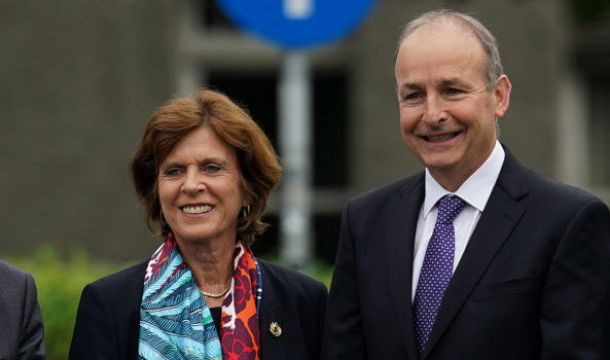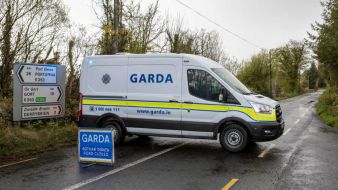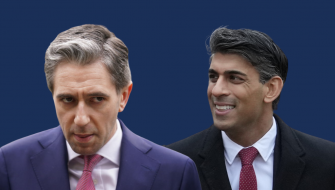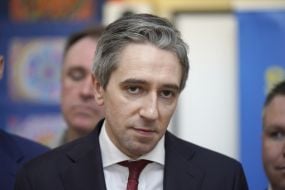The final report on the Government’s major security conference has said that Ireland’s neutrality is “neither a necessary nor a sufficient condition” for Ireland’s standing as a force for good in international affairs.
Professor Dame Louise Richardson, who was the chair of the Consultative Forum on International Security Policy, said some people have a strong and emotive attachment “to the concept of neutrality as part of our national identity”.
However, in her final report on the security forum to Tánaiste Micheál Martin, she said this “appears to be more to an abstraction than to a specific policy”.
The forum was convened to discuss Irish foreign policy and the approach to defence and security in a changing geopolitical environment.
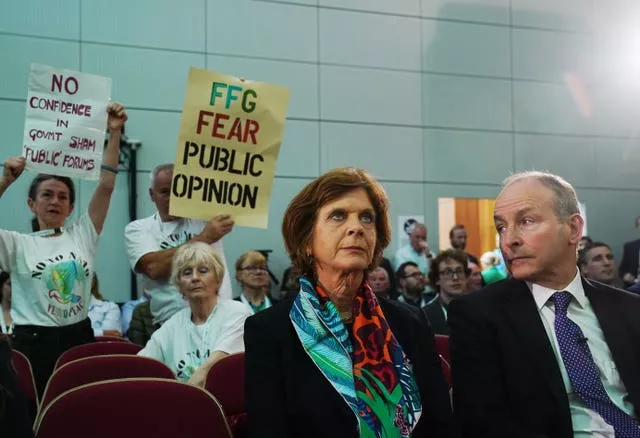
It was held across four days in June in Cork, Galway and Dublin and was disrupted by several protests.
Critics said the forum was a deliberate attempt to erode Ireland’s position on neutrality, a claim rejected by the Government.
Senior ministers had said there were no predetermined outcomes from the security forum.
In her report, Prof Richardson said there was an absence of a popular mandate to drop the current policy of neutrality.
However, she said the link between Ireland’s global reputation and its policy of neutrality “is probably more tenuous than is generally asserted” and that the policy has changed throughout the history of the State.
The forum chair said it was “difficult to argue persuasively that neutrality between an aggressor and a victim is righteous”.
She said it was also evident there was no agreed definition of neutrality in Ireland and under international law.
Prof Richardson said Irish governments have recently drawn a distinction between military and political neutrality and between military nonalignment and political nonalignment.
However, she characterised Ireland as an outlier compared with other neutral countries in Europe.
Prof Richardson said: “Austria, Finland, Sweden and Switzerland all invest heavily in their defence forces; they have conscription and very large reserves to supplement their significant standing forces.
“Ireland is not, and never has been, in a position to defend its neutrality, unlike other neutral European countries.
“Neutrality without the means to defend it necessarily entails relying on the goodwill or enlightened self-interest of others. This is not an optimal position for any sovereign state.
“Throughout the forum discussions and in the subsequent submissions, there was widespread support for increased expenditure on defence.
“It was not tested whether there was an appetite for the scale of expenditure that would be required to defend Irish neutrality, or even to deter an attack. This would require a radical change in government policy.”
She said proposals for a constitutional amendment on neutrality were another contested issue, adding it could impair future governments’ ability to respond effectively to a crisis.
Prof Richardson added: “Ireland’s conception of neutrality might more accurately be described as political alignment and military nonalignment. While Ireland’s practice of neutrality does not conform to international norms, it remains popular in Ireland.”

She noted there was “considerable disagreement” on the extent to which Ireland’s international reputation as an honest broker and positive force was due to neutrality.
Prof Richardson said some argued that it was one factor among many and that other countries were not aware of the policy.
She added that some had contended that Ireland’s policy of allowing others to provide our security amounted to “free-riding and undermined our global standing”.
Prof Richardson concluded: “It would seem, therefore, that Ireland’s policy of neutrality is neither a necessary nor a sufficient condition for Ireland’s global standing as a force for good in international affairs. The most that could be said is that it probably helps.”
Throughout the forum, it was suggested that the Constitution should be amended to include a perpetual commitment to neutrality.
Reflecting on the divided debate on the suggestion, the forum chair wrote: “In view of the rapidly changing nature of the security environment faced by the State, it would be reasonable to conclude that the imposition of rigid constraints, like a constitutional amendment, is likely to have a negative impact on the state’s ability to act effectively in the international arena.”
The security forum was not designed to make policy prescriptions.
Prof Richardson said the forum found a number of areas of agreement, including pride in Ireland’s global reputation in international affairs and the need for greater public expenditure on all three branches of the Defence Forces.
However, she said there were other areas which were contested, including that Ireland’s “triple lock” policy, which requires Dáil, government and UN Security Council approval for the deployment of more than 12 Defence Forces members on overseas peacekeeping operations, should be reconsidered.
On the triple lock mechanism, Prof Richardson wrote: “While there was not a consensus on this point, the preponderance of views, especially among the experts and practitioners, is that it is time for a reconsideration of the triple lock as it is no longer fit for purpose.”
Responding to criticism of the make-up and structure of the security forum more generally, she said: “I believe that this was an admirably open and transparent process where unfettered debate was encouraged, and a wide range of views expressed.”
Prof Richardson concludes that it will be “important to continue this national conversation on Ireland’s role in the world”.
Mr Martin said he wanted to commend Prof Richardson for her work.

Appearing before an Oireachtas committee on foreign affairs, Mr Martin said: “The question of the triple lock was also raised.
“From reading the chair’s report, it is clear that there is no one viewpoint on how best to manage the decision to deploy Irish troops abroad.
“However, in my own view, we must consider the challenges facing the UN Security Council in agreeing or renewing UN peacekeeping mandates.
“The implications of this for Ireland and our current policy is simply something we have to take seriously.”
The Tánaiste is to consider the report’s conclusions ahead of a Dáil debate in the coming weeks.
Mr Martin is then to decide whether to bring recommendations to Government.
